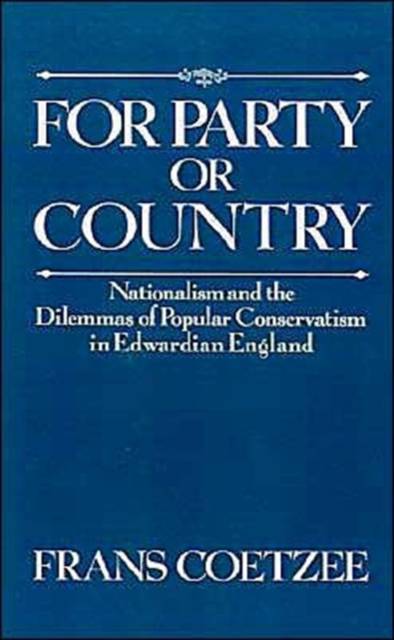
Bedankt voor het vertrouwen het afgelopen jaar! Om jou te bedanken bieden we GRATIS verzending (in België) aan op alles gedurende de hele maand januari.
- Afhalen na 1 uur in een winkel met voorraad
- In januari gratis thuislevering in België
- Ruim aanbod met 7 miljoen producten
Bedankt voor het vertrouwen het afgelopen jaar! Om jou te bedanken bieden we GRATIS verzending (in België) aan op alles gedurende de hele maand januari.
- Afhalen na 1 uur in een winkel met voorraad
- In januari gratis thuislevering in België
- Ruim aanbod met 7 miljoen producten
Zoeken
For Party or Country
Nationalism and the Dilemmas of Popular Conservatism in Edwardian England
Frans Coetzee
Hardcover | Engels
€ 241,95
+ 483 punten
Omschrijving
Lord Hugh Cecil, commenting in 1912 on the British Conservative party's staying power, said that the party's success was largely a matter of temperament, "recruited from...the natural conservatism that is found in almost every human mind." The Conservatives regarded the parties of the left as faddists or federations of pressure groups. In this thorough analysis, Coetzee examines the condition of the Conservative party during the two decades preceding World War I--a transitional period for the party, marked by the foundation of an unprecedented number of conservative pressure groups. Cecil's comment, Coetzee argues, obscures the extent to which conservative pressure groups forced their party to adapt in Edwardian England. The British Navy League, the Tariff Reform League, the Anti-Socialist Union, and a host of other groups changed the face of British conservatism, though not without considerable internal party conflict. In addition to providing a complete account of the pressure groups' origins, organizations, successes, and failures, Coetzee ties their histories to the debates within the Conservative party itself, and to the local elections. In so doing, he demonstrates how the party of the right was ultimately able to convince the electorate that its views were more "national" and "patriotic" than those of the parties of the left.
Specificaties
Betrokkenen
- Auteur(s):
- Uitgeverij:
Inhoud
- Aantal bladzijden:
- 240
- Taal:
- Engels
Eigenschappen
- Productcode (EAN):
- 9780195062380
- Verschijningsdatum:
- 28/06/1990
- Uitvoering:
- Hardcover
- Formaat:
- Genaaid
- Afmetingen:
- 154 mm x 240 mm
- Gewicht:
- 530 g

Alleen bij Standaard Boekhandel
+ 483 punten op je klantenkaart van Standaard Boekhandel
Beoordelingen
We publiceren alleen reviews die voldoen aan de voorwaarden voor reviews. Bekijk onze voorwaarden voor reviews.









